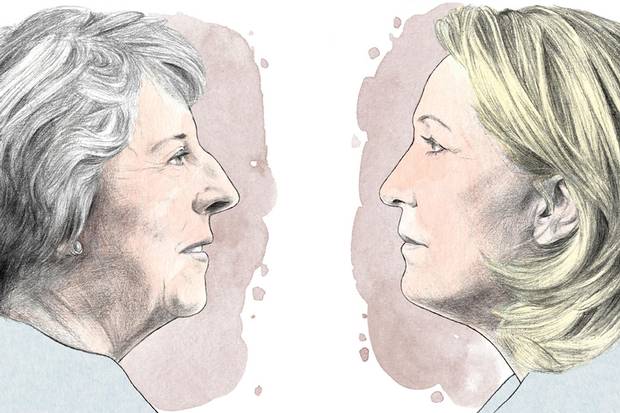After Brexit and the rise of populism across Europe, the real test of the strength of the European Union comes on Sunday when voters in France begin choosing the country's next president. And just about everyone is on edge.
These are uncertain times for France and the EU experiment. The country is in the midst of the most hotly contested election campaign since the founding of the Fifth Republic in 1958 and all signs point to a political earthquake taking shape after the first round of voting ends Sunday night. And that will only set the stage for the next phase in the race, the ultimate showdown between the top two finishers on May 7.
Four candidates are within striking distance of each other. Their platforms couldn't be more different, stretching from the far-right call of the National Front's Marine Le Pen to stop all immigration, to the hard leftist Jean-Luc Mélenchon, who wants to align France with Venezuela. In between, there's the centrist Emmanuel Macron and his upstart movement En Marche! and the Thatcherite reformer François Fillon of the Republicans. Traditional parties and establishment figures have been laid to waste by voters who seem eager to embrace new radical ideas and directions. Young people in particular have flocked to the extreme right and left, seeing the election of Ms. Le Pen or Mr. Mélenchon as the only way to smash a system they believe no longer works.
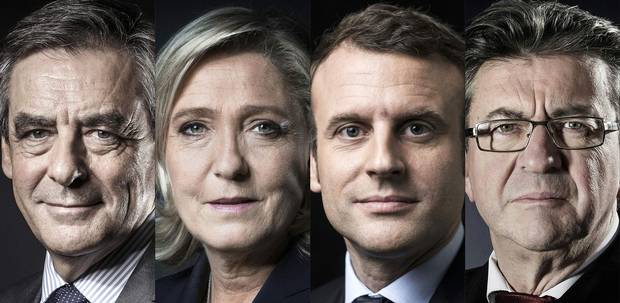
French presidential candidates François Fillon, Marine Le Pen, Emmanuel Macron and Jean-Luc Mélenchon. Read more here from The Globe’s Paul Waldie on their policies and personalities.
JOEL SAGET AND ERIC FEFERBERG/AFP/GETTY IMAGES
All of this is taking place amid a backdrop of heightened fears over security, an issue that galvanizes the followers of Ms. Le Pen, who draw a link between terrorism and immigration. Campaign events were cancelled Friday after three police officers were shot in a terrorist attack Thursday night near the Arc de Triomphe. The attack left one officer dead and prompted more soul-searching about this country's ability to confront terrorism. The perpetrator was killed by police and though it's unclear if he was born in France, that hasn't stopped the angst over radical Islam and the infiltration of Islamic State, who took credit for the attack. All week, police had beefed up their presence across the country, checking bags in public squares and patrolling campaign rallies, as terrorist threats mounted.
For Europe and the Western world, the stakes in this election could not be higher. Consider this: depending on who wins, France could soon be pulling out of the European Union, withdrawing from NATO, scrapping the euro and forming a new alliance with Russia. Even the most moderate outcome will see France demanding major changes to how the EU operates and testing the limits of Europe's open borders. With Britain already heading out the door, and an election coming there that could deliver Prime Minister Theresa May a mandate to drive a tough bargain, the EU can't afford instability in one of its core members.
If voters like Hugo Poidevin are any indication, the EU is in for a difficult time with France. "I've been raised with the ideal of the European Union, which is that it leads the people together for better, for good. I grew up with that dream. But that dream is not true," said Mr. Poidevin, a 24-year-old university student from Normandy. "They forced us to believe in a Eurozone that's not true… They betrayed us, everyone. They betrayed us about changing Europe. They betrayed us about everything."
For him and millions of other young people who face a youth unemployment rate that hovers around 23 per cent, and a labour market that's so rigid, few can expect more than a short-term contract, the only choice is Mr. Mélenchon or Ms. Le Pen. "We think a change can only come with a new majority and not with the old party that has blown everything since 50 years," he said.
It's that kind of anger that has experts like political scientist Dominique Moïsi calling this the most important election in a generation. This campaign is being driven by "anger, fear and nostalgia," he said. Anger at years of chronically high unemployment, fear about immigration and nostalgia for a time when some believe the country had neither, he explained.
"The French today are at a turning point, for them and for the entire European continent," said Mr. Moïsi, a senior counselor at the Institut Montaigne, a Paris-based think tank.
That France should even be wavering in its relationship with the EU is stunning. After all, this is where the origins of the EU took shape. In 1951, France and five other European countries signed the Treaty of Paris, creating the European Coal and Steel Community (ECSC). That laid the foundations for the European Parliament, the Special Council of Ministers and the European Court of Justice. As the ECSC developed into what became the EU, France was an eager participant, joining the euro, hosting the European Parliament and pioneering the concept of open borders and the free movement of people between member states.
Enthusiasm for the EU soared in France during the 1980s and 1990s, when it was led by Jacques Delors, a former French cabinet minister. Mr. Delors helped shape the modern-day EU and laid the groundwork for the introduction of the euro. He also oversaw the rapid expansion of the EU in the wake of the fall of the Berlin Wall and the collapse of the Soviet Union. For countries across Eastern Europe, EU membership was seen as a path to a bright future as part of a rising power block that could serve as a counterweight to the United States and China.
Not everyone in France welcomed the push for expansion. Former President François Mitterrand worried about accepting so many new members with weak democratic institutions and of varying economic standings. He proposed a kind of confederation, something that would give the new countries a form of membership but keep them out of the core EU arrangements like the single market and open borders. But his efforts were thwarted, largely at the behest of the U.S., which was keen to see former Soviet satellites join the EU, and NATO, as quickly as possible in order to keep them out of the Russian sphere of influence.
Real cracks in French support for the EU emerged in 2005, when the EU came up with a constitution to set out the union's legal framework. It was more like a 400-page rule book that outlined the powers of various EU institutions and the workings of the single market. The French government held a referendum on whether to ratify the constitution and President Jacques Chirac took it pretty much for granted that voters would overwhelmingly vote Yes. They didn't. In a stunning upset, the No side took 55 per cent of the vote, leaving the government searching for answers and the EU eventually scrapping the constitution after voters in the Netherlands rejected it as well.
"Europe had become a more and more remote external body and the constitution made it even more complex," said Pierre Haski, a political analyst based in Paris. "They were voting against something that had become too intrusive and too much lacking transparency."
Four years later, the EU repackaged much of the proposed constitution into the Treaty of Lisbon. Instead of putting that treaty to a referendum, the French government presented it to parliament, where it was adopted. That infuriated those who led the No side in 2005. And many of those voices are now at the forefront of the current presidential election campaign, including Mr. Mélenchon and Ms. Le Pen.
"What was the point of asking people for their opinion if you didn't take it into account?" Mr. Haski asked, by way of explaining the current frustration. "That's a wound that is very much present in today's debate."
By 2009, France also faced economic pressures from the financial crisis, leading to more disenchantment with the EU and the governing parties. Unemployment soared above 10 per cent, where it has generally remained ever since. The government's fiscal plans went astray and President Nicolas Sarkozy and his successor François Hollande largely failed in their attempts to introduce reforms that would encourage more employment.
The crisis also exposed deep and persistent problems in the French economy. The government has run an annual deficit for 43 years and the country's total debt is almost equal to the size of its entire economy, a figure that puts France among the highest debtholders in the EU. Government spending is equal to 57 per cent of the gross domestic product, one of the highest ratios among developed countries. The comparable ratio in Britain is 38 per cent and 40 per cent in Germany. French labour market regulations are so complex that companies have shied away from hiring full-time staff, preferring shorter contracts with easier layoff provisions. As a result, 86 per cent of all hiring last year was for temporary positions, and 80 per cent of those jobs were for contracts lasting less than one month.
"You have the situation of an insider-outsider labour market," said Bruno Cavalier, chief economist at ODDO BHF, a Paris-based investment firm. "For people aged 25 to 45, it's close to full employment, and if you are inside the system and have a job, it's great. For the people close to retirement age, if they lose their job they won't find another one. And for the young, it's very difficult to find work."
That's true for people like Chloé Lescoules, 26, who is frustrated with her career prospects. She graduated from law school in Paris last year and is hoping to break into the art market as an auctioneer. But the only job she could land was a temporary internship. "To go through [and land a career], it's hard," she said. "It needs to change." Part of the problem, she added, is the cronyism in the art world, where jobs are handed out to friends and relatives, as well as the licensing fee for auctioneers which can reach €400,000, or $576,000 (CAD). Some changes have been made to ease the process, including lowering the fee, she added. But it's still hard to find work, and, as a result, Ms. Lescoules became so fed up with politicians and their promises, she spoiled her ballot in the last presidential election. "I was angry against all the parties," she said. She's supporting Mr. Macron this time and hopes he can bring some real change to the system.
Ms. Lescoules also backs the EU and she wants France to remain in the union. But many others see the EU as a burden that makes France's unemployment problem even worse. They focus on EU regulations like the "posted worker" rule, which allows companies in one EU member state to assign workers to a branch operation in another EU country, so long as they pay those workers the host country's minimum wage. But with minimum wages varying across the EU, posted workers from Eastern Europe can earn far more in France. Its minimum wage is about €1,480 a month, compared to about €450 in Poland.
France is home to about 286,000 of these so called detached workers, one of the highest totals in the EU. In some parts of the country, these employees have become a source of friction, amid complaints they undercut wages and drive out job opportunities for local workers. The EU has wrestled with the issue for years but it faces resistance from many Eastern European countries who see the measure as a key benefit for their citizens. The debate over detached workers has also morphed into general disgruntlement about workers from Eastern Europe, something that drove many in Britain to vote to leave the EU last June.
All of the four leading contenders for the French presidency have vowed to either ignore the posted worker rules or force the EU to change the measures. And some, like Ms. Le Pen, want to introduce French-only language laws in workplaces to ensure jobs go to locals first.
Many French voters have also grown fed up with the complexity of the EU, seeing it as an amorphous, opaque entity that isn't relevant to their day to day lives. That's a view shared by others in the EU, even in the Netherlands, which recently re-elected a pro-EU government in the face of a rising populist revolt similar to France's. Dutch politician Kees Verhoeven said the EU needs to be wary of the growing concerns in countries like Holland and France. "Nobody understands what [the EU] is doing," said Mr. Verhoeven, a leading figure in D66, a Dutch party that is committed to the EU. "People hate it. They just want an effective, sober, lean and mean organization that solves the big problems."
Mr. Haski points to another dilemma, a series of ineffective EU leaders who have been incapable of coping with major challenges. He cites a string of recent figures including former British Prime Minister David Cameron, departing Italian Prime Minister Matteo Renzi, Spanish Prime Minister Mariano Rajoy, Mr. Sarkozy and Mr. Hollande. "They could have been good managers of prosperity, but they were not the people up to the level of the challenge of today and to re-think the whole system," he said. For him and many others, France has essentially stood still for the last 10 years while other EU countries, particularly Germany, have recovered and roared ahead.
It's that sense of stagnation that has spurred the shift toward non-traditional candidates in this presidential election. For many people, Mr. Sarkozy was a failure of the right and Mr. Hollande a disaster on the left, so why stick with the two traditional parties?
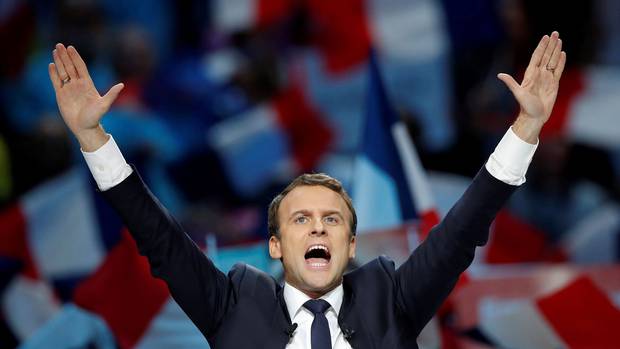
Emmanuel Macron attends a campaign political rally in Paris on April 17, 2017.
CHRISTIAN HARTMANN/REUTERS
That's been the message of Mr. Macron, a 39-year-old former banker who has never run for public office and resigned from Mr. Hollande's cabinet last year to launch En Marche! The movement has amassed nearly 300,000 members and vaulted Mr. Macron into the lead among the four contenders. He's running on a platform of "neither right nor left" and promises to draw advice from all sides and implement significant labour-market reforms without jeopardizing France's social safety net. He's also committed to a strong EU, though he wants to see changes. It's a tall order and many have questioned whether he is up to the task. And while he has been leading in the opinion polls, his support is soft and he is only marginally ahead of Ms. Le Pen.
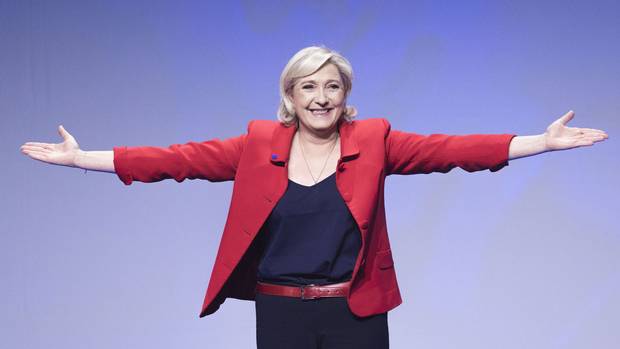
Marine Le Pen gestures as she arrives for a campaign meeting in Paris on April 17, 2017.
KAMIL ZIHNIOGLU/ASSOCIATED PRESS
Ms. Le Pen too is positioning herself as the anti-establishment candidate, even though her party has been around for 40 years. She's reinvented the National Front since becoming leader in 2011, toning down its harsh language and expelling her father, party founder Jean-Marie Le Pen, who had become a liability with his blatant anti-Semitism. She now talks about immigration largely in economic terms, saying new arrivals are threatening jobs and wages. However, her campaign has floundered and she has been slipping in some recent polls, raising questions about whether she will make it to the second round. But even if she doesn't, Ms. Le Pen is expected to double the party's best vote total, setting her up for major gains in parliamentary elections in June.
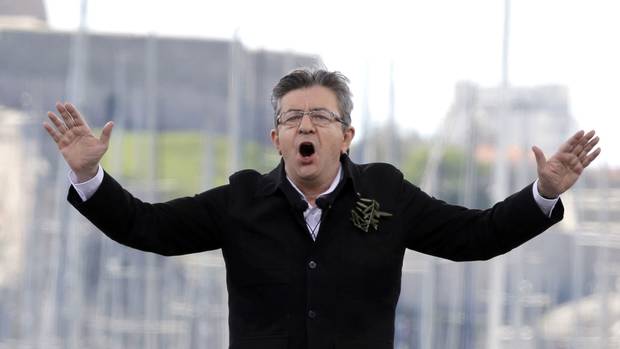
Jean-Luc Mélenchon speaks in Marseilles on April 9, 2017.
CLAUDE PARIS/ASSOCIATED PRESS
Mr. Mélenchon, 65, is the true radical in the race, storming the country with a firebrand pitch of communism that calls for a tax rate of 90 per cent on income over €400,000, limits on corporate dividends, withdrawing France from NATO and the EU and instead forming an alliance with Venezuela and Russia. He's captured the imagination of young people and become such a social media sensation that his YouTube channel has nine times more subscribers than Mr. Macron's and Ms. Le Pen's combined. Mr. Mélenchon has been a politician for more than 30 years, holding positions at every level of government including serving briefly as a cabinet minister in a Socialist government. He broke with the Socialists in 2008 and has led a leftist movement called La France Insoumise (Unsubmissive France). Polls put him in third, but only just behind Ms. Le Pen and Mr. Macron.

François Fillon makes a speech during a campaign meeting in Paris on Jan. 29, 2017.
CHRISTOPHE ENA/ASSOCIATED PRESS
For France's traditional parties, the Republicans and Socialists, this election has become a nightmare. Mr. Fillon of the Republicans is campaigning on an agenda of reforms that would see 500,000 civil servants laid off and sweeping changes to the country's labour laws and cherished 35-hour work week. But the former prime minister has been hampered by allegations he put his wife on the public payroll even though she did no work. It's even worse for the Socialists, a party that just five years ago held the presidency and controlled the National Assembly and the Senate. Now its candidate, Benoît Hamon, is running fifth and may get less than 10 per cent of the vote on Sunday.
Most of the smart money is on Mr. Macron and Ms. Le Pen finishing first and second on Sunday, with Mr. Macron winning the runoff on May 7. There are indications his pro-EU message might be getting through. The country's economy is also showing signs of turning around and the economic performance across the Eurozone has been strengthening lately. But no one is certain and polls show any one of Mr. Macron, Ms. Le Pen, Mr. Fillon and Mr. Mélenchon could make it to the second round.
That's left people like Jeanne Mertens fretting. She's 69 years old and recently retired from her job with the Ministry of Environment. She's a long-time socialist but she's so disenchanted with the party and the overall election campaign that she might not even vote.
"It's sad," she said this week as she stood on the edge of the Place de la République, watching Mr. Hamon's last major campaign rally. Despite the warm sunshine, lively music and colourful balloons, Ms. Mertens said she was anxious about where the country was headed.
"I worry for my three grandchildren," she said. "I worry about the future."
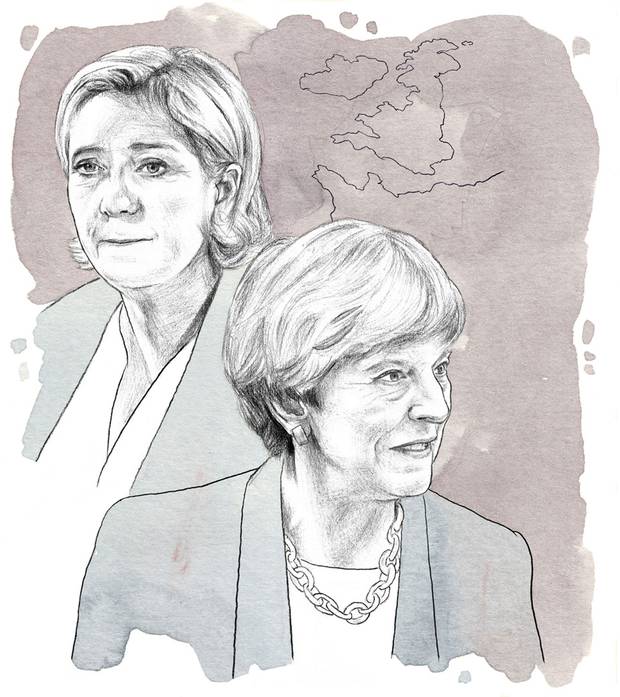
ILLUSTRATION BY PETER JAMES FIELD FOR THE GLOBE AND MAIL
Paul Waldie is The Globe and Mail's European correspondent.
EUROPE'S DAYS OF DECISION: MORE FROM THE GLOBE AND MAIL
